NB: The following contains spoilers for The Empire Strikes Back and Return Of The Jedi.
It’s the autumn of 1978, and Star Wars mania is still riding high. Less than a year after the first film became a pop cultural phenomenon, there’s already speculation about what might happen in its sequel – and at a store in California, actor David Prowse stokes the excitement among fans even further.
As a bustling crowd forms to get autographs or take photographs, Prowse, the six-foot-five actor who plays the evil Darth Vader, delivers an exciting morsel of information. The sequel, then simply known as Star Wars II, will begin filming in 1979. The bad news? The finished film won’t be out until the spring of 1980. The good news: it’ll be followed by Star Wars III.
Somewhat intoxicated, perhaps, by all the fan attention, Prowse then drops an even bigger bombshell: Darth Vader is, in fact, Luke Skywalker’s father. “Father can’t kill son, son can’t kill father,” the British actor says, “so they live again to star in Star Wars IV.”
It’s the kind of information that, if leaked today, would spread like wildfire around the internet – arguably the biggest secret in what would eventually become The Empire Strikes Back. Years later, Prowse would claim that his outburst in Berkeley, California was simply a lucky guess – in the autumn of 1978, the sequel’s script hadn’t yet been written, much less handed out to actors.
All the same, Prowse’s revelation may have reminded George Lucas and his collaborators how important it was to keep plot details from leaking out to the wider public. Before long, the father-son twist had appeared in at least one newspaper, as you can see in this yellowed clipping from 1978; Lucasfilm was lucky the news didn’t spread even further.
When work began on The Empire Strikes Back the following year, Lucas went to famously elaborate lengths to protect further leaks. The film’s third-act revelation was left out of the shooting script given to the cast and crew; while the physical confrontation between Luke and Darth Vader remained, the famous line, “I am your father,” was kept a secret.
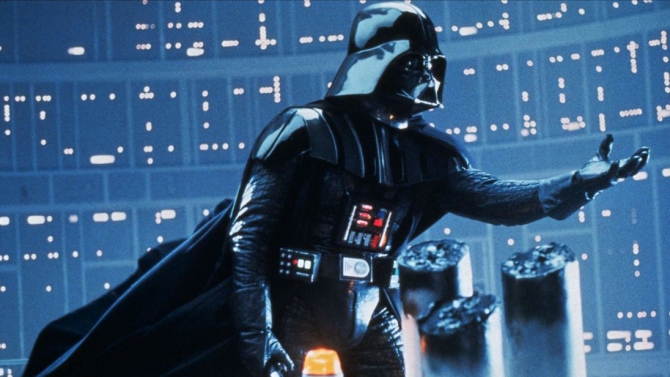
According to several interviews given by members of the cast since, the only people who knew about the line were Lucas, producer Gary Kurtz, and director Irvin Kershner. Kershner eventually told Luke actor Mark Hamill, but only shortly before the scene was filmed. James Earl Jones, the actor who provided Darth Vader’s voice, was given the correct dialogue much later during post-production; during filming, Prowse was either given a different line to utter on stage, or never said it at all, depending on which account you read.
As a result, one of the most famous revelations in sci-fi history was preserved largely intact; although rumours had circled in playgrounds all over the world – and the Empire Strikes Back novelisation almost blew the secret several weeks before the film’s release – the scene retained plenty of its dramatic charge.
If anything, the air of secrecy surrounding Star Wars III – later Revenge Of The Jedi, then Return Of The Jedi – was greater still. That the third film in the trilogy was shot under the production title Blue Harvest – a tactic intended to prevent service providers from putting up their asking prices – is now part of geek folklore. What’s slightly less well-known is just how tightly guarded the script was.
According to producer Howard Kazanjian, only three complete copies of the Return Of The Jedi screenplay ever existed – one belonged to Lucas, another to director Richard Marquand, and a third to Kazanjian himself. On set, actors were given the relevant pages for a scene in sealed envelopes – sometimes, according to an article published in a 1983 issue of Starlog, mere minutes before the scene was about to be shot.
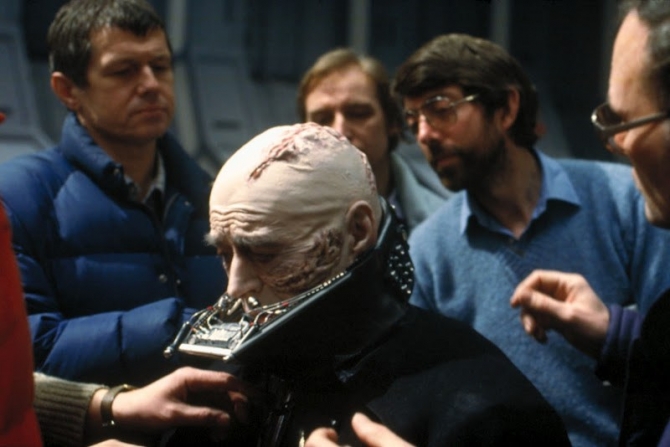
To obfuscate the truth even further, the filmmakers took the unusual step of handing around fake versions of the script to actors “who we felt were security risks,” according to Richard Marquand.
“There was one particular actor who gave an interview to the English press about the movie’s plot,” Marquand said, “which extremely upset us. But we knew that the actor was a security risk and had actually not given him the correct lines of dialogue. He fell completely into the trap.”
Marquand then went on to suggest that the actor – who he doesn’t name – then repeated the information in the fake script to the journalist. Sure enough, the next day, “the paper came out, having printed all this totally misleading information.”
“We were very disappointed that he did it,” the director continued. “He was very apologetic and said he was a very weak man. When the press phoned him, he found it hard to turn them down.”
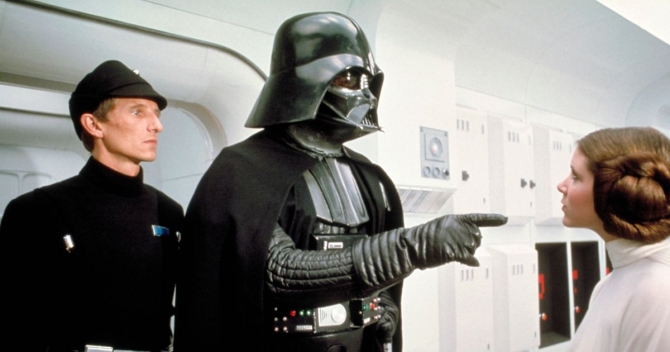
Producer Howard Kazanjian confirms that the existence of fake scripts on set caused a certain amount of confusion; he relates a story where a well-meaning assistant snuck into his office to remove Kazanjian’s copy of the screenplay, hoping to have the fragile document bound in leather as a birthday gift; unwittingly, the assistant had pilfered and bound one of the fakes.
All the same, the precise script leak that Marquand describes – and the actor who leaked it – remains something of a mystery. It could be assumed that the person in question was David Prowse, given his track record, though Kazanjian later stated that Prowse “never got any information” during filming:
“For delicate information lines, he would simply count one, two, three , four, or read a fictitious line in character to the real dialogue,” Kazanjian said. “Only at the ADR session with James Earl Jones would James then be given the line.”
This certainly suggests that Prowse was one of the “security risks” Marquand mentioned – and Prowse himself later said that he’d never been given a full script for either The Empire Strikes Back or Return Of The Jedi. All the same, Marquand’s description of false plot details leaking to a British newspaper don’t quite line up with the historical record.
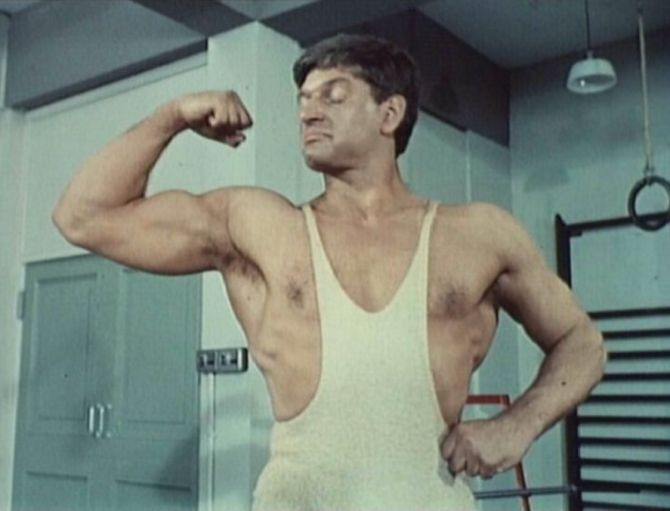
In 1982, approximately one year before Return Of The Jedi’s release, one UK tabloid did indeed leak a valuable plot spoiler: that Darth Vader died at the end of the movie. The important point is that this clearly isn’t from a fake script, because this really does happen in Marquand’s final cut; Vader has a last-minute change of heart, saves Luke from Emperor Palpatine, and dies in the process.
According to Chris Taylor’s book, How Star Wars Conquered The Universe, David Prowse was wrongly blamed as the source of this leak – and, as a result, Prowse was “almost completely sidelined”; in several fight scenes between Luke and Vader, Prowse was replaced by stunt actor Bob Anderson, who was more adept with a Lightsaber. When it came to the fateful moment where a dying Vader has his helmet removed, actor Sebastian Shaw awaits beneath, and not Prowse.
Whether he meant it to or not, Marquand’s story about a story leak and an actor apologising for being “a very weak man” could have been a late sign of the growing antipathy between Prowse and Lucasfilm. It was a rift that had its origins back in 1977, when Lucas had James Earl Jones provide Darth Vader’s voice in the original Star Wars – something Prowse has long said he didn’t know about until he saw the final cut in a theatre. Rightly or wrongly, Prowse felt a certain sense of proprietorship over the character he’d help bring to the screen, and was clearly irked by Lucasfilm’s seeming efforts to distance him from Vader.
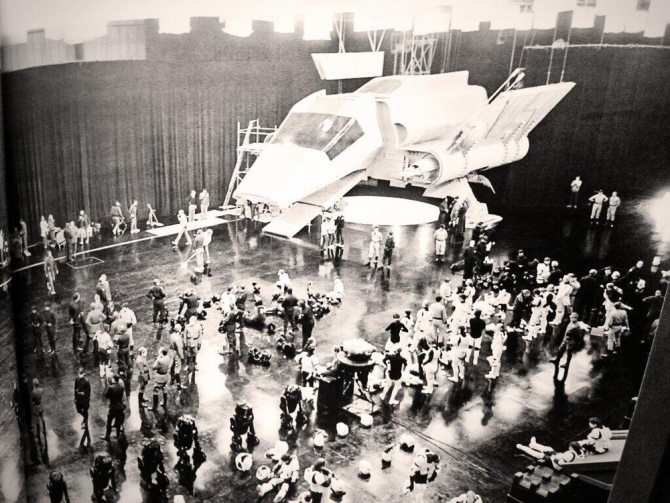
Prowse’s eagerness to speak to the press made Lucasfilm understandably nervous, even if his “Vader is Luke’s father” revelation was just a lucky guess, as he later claimed. The making of Empire and Return Of The Jedi were both difficult processes, for a variety of reasons, whether it was actors clashing with directors or directors clashing with Lucas. The desire for utmost secrecy certainly didn’t help – especially when wily reporters started calling.
According to Prowse, one journalist called him at his gym one day in the early 80s, ostensibly to talk to him about his weightlifting career. Prowse agreed, and, according to his recollection, published at The Void, the reporter didn’t start talking about Star Wars until halfway through their conversation.
He turned up at my gymnasium that evening and halfway through he says, ‘you know you’re being killed off in this movie, don’t you? And another guy’s playing the dying Darth Vader?’ I said ‘they wouldn’t do that – they wouldn’t go and unmask somebody else after I’ve played the part for six years’. He asked if I had a call sheet, and he looked at it and it said: ‘Dave Prowse, Darth Vader, Studio 1’, and underneath it ‘Sebastian Shaw, Anakin Skywalker, Studio 10’.
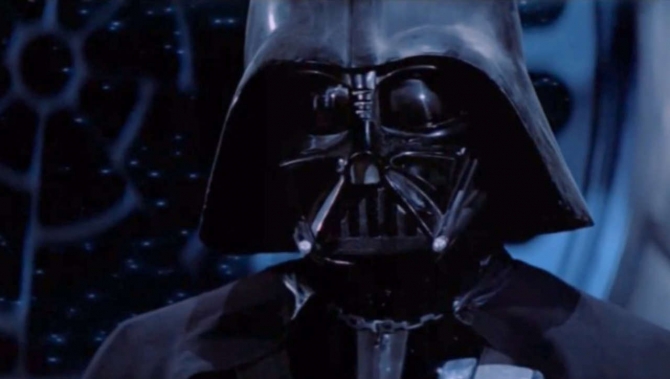
Prowse goes on to say that, the next day, the Daily Mail ran a story with the headline, “Darth Vader to be killed off in the next movie, in an interview with David Prowse.”
“And that ruined my association with Star Wars,” Prowse said. “I was ostracised while on the movie, the producer and director wouldn’t work with me and Lucas wouldn’t speak to me. I had six weeks of purgatory.”
In his autobiography Straight From The Force’s Mouth, Prowse repeats the claim that he didn’t even know about Vader’s death, and that it was the reporter who’d broken the news to him, and not the reverse.
“I couldn’t sleep that night for thinking about it,” Prowse wrote; “it played on my mind all the following day and I seethed throughout the hour and a half’s drive up to the studio on the Thursday morning.”
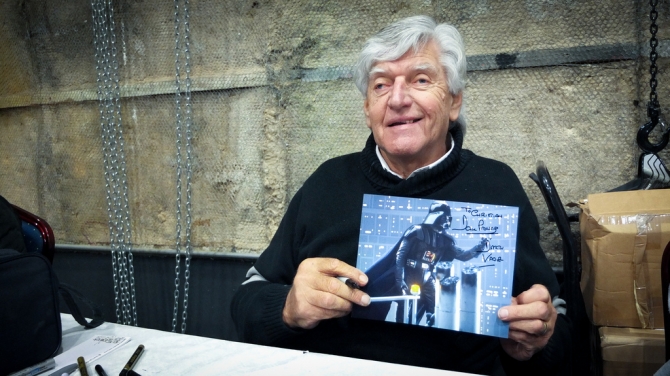
When Prowse arrives on set, he recalls that the newspaper had already landed on George Lucas’ desk.
Years later, director Marcus Cabotoa’s 2015 documentary I Am Your Father attempted to dig into the story behind Prowse’s deteriorating relationship with Lucasfilm, and even managed to track down the Daily Mail journalist who’d spoken to Prowse at his gymnasium all those year earlier. According to the journalist, Prowse hadn’t spoiled anything – the leak had evidently emerged from another source.
Nevertheless, the damage was done. Prowse was barely used in Return Of The Jedi, lost contact with George Lucas after the film’s making and, in 2010, effectively blocked from appearing at official Star Wars conventions – apparently because of his participation in The People Versus George Lucas, a documentary that painted the Star Wars creator in a less than flattering light.
Now aged 82, Prowse has retired from his once brisk tour on the fan convention circuit, and the Vader role has long since passed onto other actors. In 2005’s Revenge Of The Sith, the prequel that saw Anakin Skywalker transformed into the Sith Lord, Vader was played by an uncredited Gene Bryant. In Rogue One, he was played by imposing Welsh actor Spencer Wilding.
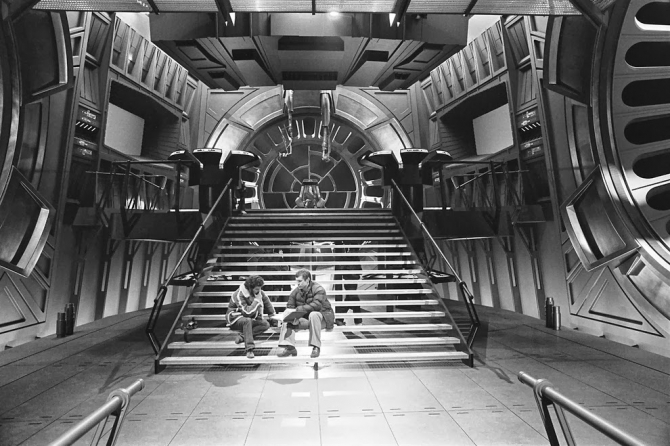
It’s worth noting, though, just how much physicality Prowse brought to Vader, even though the character is a composite of so many other parts – John Mollo’s unforgettable character design, for example, and James Earl Jones’s booming voice. Lucasfilm may have disliked him writing things like “David Prowse IS Darth Vader” in autograph books, or grousing about a lack of residual income from Return Of The Jedi, but his distinctive movements were undoubtedly a part of the character’s power.
Years later, it does seem as though Prowse is getting some of his due; I Am Your Father provides another angle on the story, while a fictionalised version of the Prowse saga is also reportedly on the way, thanks to screenwriters Nicholas Jacobson-Larson and Dalton Leeb’s screenplay, Strongman.
Decades later, uncertainty still surrounds these old Star Wars stories. How did Prowse so accurately predict the twist in Empire Strikes Back, seemingly months before it was even written? Had somebody told him there’d be a third chapter in the saga as early as 1978? And if it wasn’t Prowse who leaked the news of Vader’s death to the UK press in 1982, then who on earth was it? To paraphrase the mighty Yoda, the Dark Side still clouds this particular part of Star Wars history.

